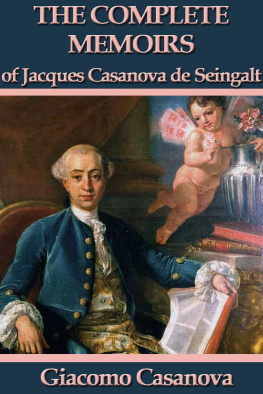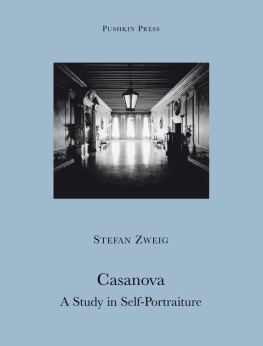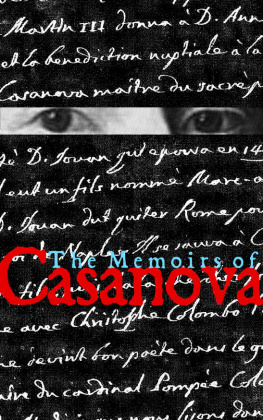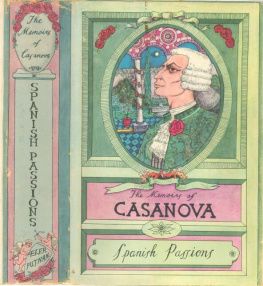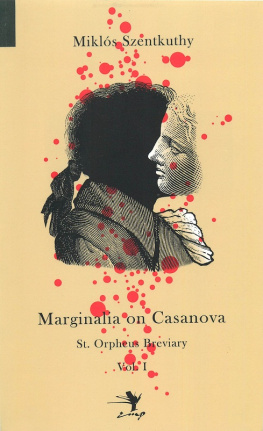The Complete Memoirs of Jacques
Casanova de Seingalt
Translated by Arthur Machen
by Giacomo Casanova
Start Publishing LLC
Copyright 2012 by Start Publishing LLC
All rights reserved, including the right to reproduce this book or portions thereof in any form whatsoever.
First Start Publishing eBook edition January 2014
Start Publishing is a registered trademark of Start Publishing LLC
Manufactured in the United States of America
10 9 8 7 6 5 4 3 2 1
ISBN 978-1-62558-169-3
Casanova at Dux
An Unpublished Chapter of History, By Arthur Symons
I.
The Memoirs of Casanova, though they have enjoyed the popularity of a bad reputation, have never had justice done to them by serious students of literature, of life, and of history. One English writer, indeed, Mr. Havelock Ellis, has realised that there are few more delightful books in the world, and he has analysed them in an essay on Casanova, published in Affirmations, with extreme care and remarkable subtlety. But this essay stands alone, at all events in English, as an attempt to take Casanova seriously, to show him in his relation to his time, and in his relation to human problems. And yet these Memoirs are perhaps the most valuable document which we possess on the society of the eighteenth century; they are the history of a unique life, a unique personality, one of the greatest of autobiographies; as a record of adventures, they are more entertaining than Gil Blas, or Monte Cristo, or any of the imaginary travels, and escapes, and masquerades in life, which have been written in imitation of them. They tell the story of a man who loved life passionately for its own sake: one to whom woman was, indeed, the most important thing in the world, but to whom nothing in the world was indifferent. The bust which gives us the most lively notion of him shows us a great, vivid, intellectual face, full of fiery energy and calm resource, the face of a thinker and a fighter in one. A scholar, an adventurer, perhaps a Cabalist, a busy stirrer in politics, a gamester, one born for the fairer sex, as he tells us, and born also to be a vagabond; this man, who is remembered now for his written account of his own life, was that rarest kind of autobiographer, one who did not live to write, but wrote because he had lived, and when he could live no longer.
And his Memoirs take one all over Europe, giving sidelights, all the more valuable in being almost accidental, upon many of the affairs and people most interesting to us during two-thirds of the eighteenth century. Giacomo Casanova was born in Venice, of Spanish and Italian parentage, on April 2, 1725; he died at the Chateau of Dux, in Bohemia, on June 4, 1798. In that lifetime of seventy-three years he travelled, as his Memoirs show us, in Italy, France, Germany, Austria, England, Switzerland, Belgium, Russia, Poland, Spain, Holland, Turkey; he met Voltaire at Ferney, Rousseau at Montmorency, Fontenelle, dAlembert and Crebillon at Paris, George III. in London, Louis XV. at Fontainebleau, Catherine the Great at St. Petersburg, Benedict XII. at Rome, Joseph II. at Vienna, Frederick the Great at Sans-Souci. Imprisoned by the Inquisitors of State in the Piombi at Venice, he made, in 1755, the most famous escape in history. His Memoirs, as we have them, break off abruptly at the moment when he is expecting a safe conduct, and the permission to return to Venice after twenty years wanderings. He did return, as we know from documents in the Venetian archives; he returned as secret agent of the Inquisitors, and remained in their service from 1774 until 1782. At the end of 1782 he left Venice; and next year we find him in Paris, where, in 1784, he met Count Waldstein at the Venetian Ambassadors, and was invited by him to become his librarian at Dux. He accepted, and for the fourteen remaining years of his life lived at Dux, where he wrote his Memoirs.
Casanova died in 1798, but nothing was heard of the Memoirs (which the Prince de Ligne, in his own Memoirs, tells us that Casanova had read to him, and in which he found du dyamatique, de la rapidite, du comique, de la philosophie, des choses neuves, sublimes, inimitables meme) until the year 1820, when a certain Carlo Angiolini brought to the publishing house of Brockhaus, in Leipzig, a manuscript entitled Histoire de ma vie jusqu a lan 1797, in the handwriting of Casanova. This manuscript, which I have examined at Leipzig, is written on foolscap paper, rather rough and yellow; it is written on both sides of the page, and in sheets or quires; here and there the paging shows that some pages have been omitted, and in their place are smaller sheets of thinner and whiter paper, all in Casanovas handsome, unmistakable handwriting. The manuscript is done up in twelve bundles, corresponding with the twelve volumes of the original edition; and only in one place is there a gap. The fourth and fifth chapters of the twelfth volume are missing, as the editor of the original edition points out, adding: It is not probable that these two chapters have been withdrawn from the manuscript of Casanova by a strange hand; everything leads us to believe that the author himself suppressed them, in the intention, no doubt, of re-writing them, but without having found time to do so. The manuscript ends abruptly with the year 1774, and not with the year 1797, as the title would lead us to suppose.
This manuscript, in its original state, has never been printed. Herr Brockhaus, on obtaining possession of the manuscript, had it translated into German by Wilhelm Schutz, but with many omissions and alterations, and published this translation, volume by volume, from 1822 to 1828, under the title, Aus den Memoiren des Venetianers Jacob Casanova de Seingalt. While the German edition was in course of publication, Herr Brockhaus employed a certain Jean Laforgue, a professor of the French language at Dresden, to revise the original manuscript, correcting Casanovas vigorous, but at times incorrect, and often somewhat Italian, French according to his own notions of elegant writing, suppressing passages which seemed too free-spoken from the point of view of morals and of politics, and altering the names of some of the persons referred to, or replacing those names by initials. This revised text was published in twelve volumes, the first two in 1826, the third and fourth in 1828, the fifth to the eighth in 1832, and the ninth to the twelfth in 1837; the first four bearing the imprint of Brockhaus at Leipzig and Ponthieu et Cie at Paris; the next four the imprint of Heideloff et Campe at Paris; and the last four nothing but A Bruxelles. The volumes are all uniform, and were all really printed for the firm of Brockhaus. This, however far from representing the real text, is the only authoritative edition, and my references throughout this article will always be to this edition.
In turning over the manuscript at Leipzig, I read some of the suppressed passages, and regretted their suppression; but Herr Brockhaus, the present head of the firm, assured me that they are not really very considerable in number. The damage, however, to the vivacity of the whole narrative, by the persistent alterations of M. Laforgue, is incalculable. I compared many passages, and found scarcely three consecutive sentences untouched. Herr Brockhaus (whose courtesy I cannot sufficiently acknowledge) was kind enough to have a passage copied out for me, which I afterwards read over, and checked word by word. In this passage Casanova says, for instance: Elle venoit presque tous les jours lui faire une belle visite. This is altered into: Cependant chaque jour Therese venait lui faire une visite. Casanova says that some one avoit, comme de raison, forme le projet dallier Dieu avec le diable. This is made to read: Qui, comme de raison, avait saintement forme le projet dallier les interets du ciel aux oeuvres de ce monde. Casanova tells us that Therese would not commit a mortal sin pour devenir reine du monde; pour une couronne, corrects the indefatigable Laforgue. Il ne savoit que lui dire becomes Dans cet etat de perplexite; and so forth. It must, therefore, be realized that the Memoirs, as we have them, are only a kind of pale tracing of the vivid colours of the original.

